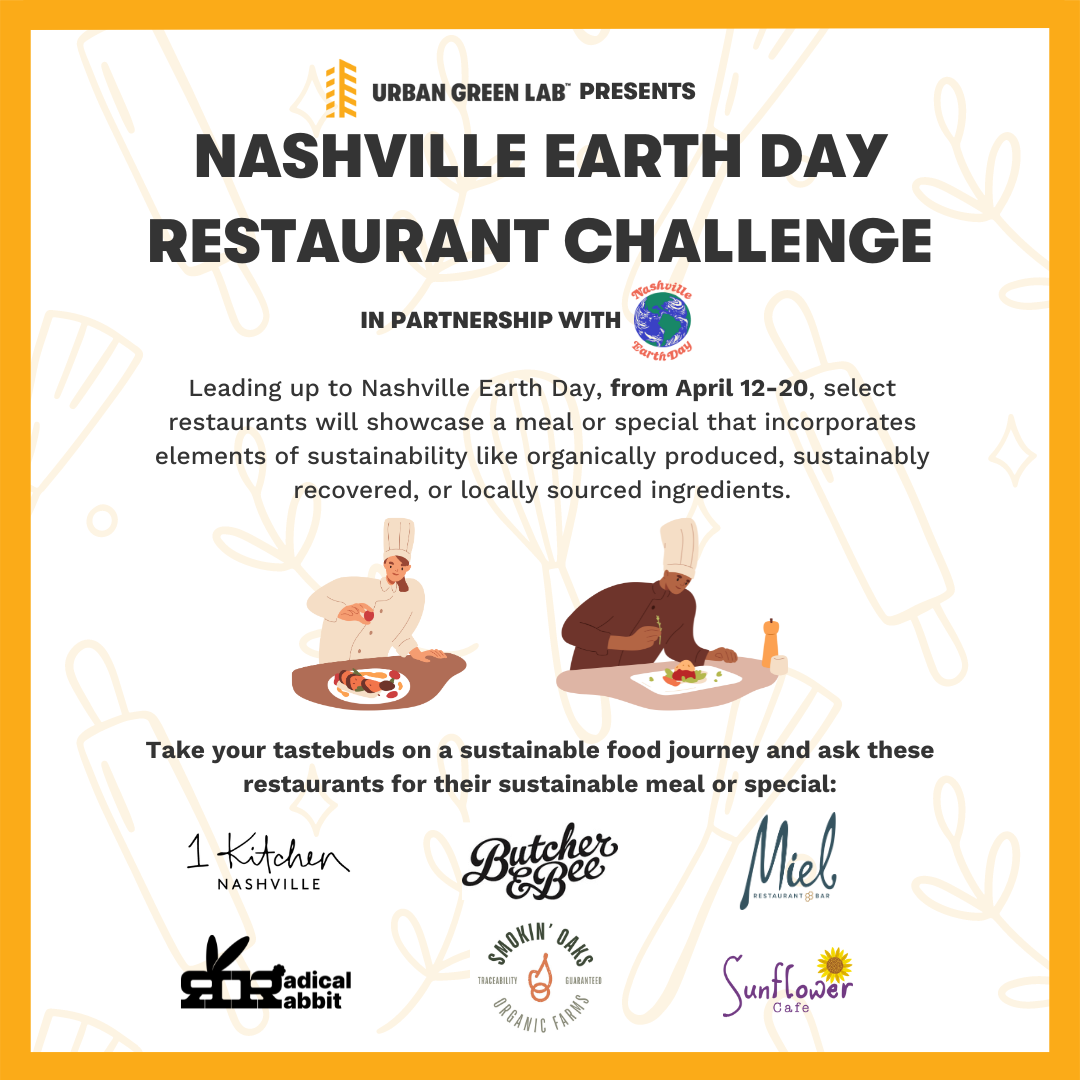Earth Month is a great time to reflect on the sustainable choices we make every day. Eating a meal is one of the best opportunities to mindfully practice sustainability. Food is a universal connector. Food links us to culture, community, family, and friends–but also connects us to the greater journey food takes to arrive at your plate.
In choosing one of the restaurants' specials in our Nashville Earth Day Restaurant Challenge from April 12-20, we hope you can see and taste the intentionality of the kitchen that prepared it.

We encourage you to think about all the hands and resources that thoughtfully worked to lessen each bite’s impact on the earth and our community. We thank the remarkable chefs and kitchen teams at 1 Kitchen Nashville, Butcher & Bee, Miel, Radical Rabbit, Smokin' Oaks, and Sunflower Cafe, who have committed to championing sustainability on their menu for a better Nashville.
Tips for dining deliberately during Earth Month and beyond
- Look for Local
- The TN seal says it all–agriculture and commerce. We can reap all the delicious benefits here in Nashville! The demand for local food has increased to an 8 billion dollar industry in recent years. Food that is grown close to home enjoys a lower carbon footprint in transportation and refrigeration emissions and requires less processing with chemicals to keep fresh. Local food sources also support TN economies. (usda.gov) (nrdc.org)(extension.unh.edu)
- Eat the Rainbow
- Eating more fruits and veggies is not only good for your overall health, but does move the greenhouse gas (GHG) dial. Choosing to eat more plants and plant-based proteins has significant potential to reduce food-related emissions. Shifting even one meal a week to a fully plant-based diet can make a big difference. Extra points for seasonally grown fare–the anticipation is always worth the wait! (eli.org) (Environmental Science & Techology)
- Opt for Organic
- Look for farms that prioritize organics: crops raised without synthetic pesticides and meats responsibly sourced through sustainable livestock practices like free range. While purchasing from local farms is best, it's important to remember distance traveled isn’t the only sustainability impact on food. Predominately, commercial growing methods use synthetic pesticides and fertilizer. These growing methods account for 83% of the overall emissions from food production. Using less fertilizers and pesticides in growing crops can reduce GHG emissions by 20% alone! Eating organic means more resilient, climate-smart, and nutritious crops and livestock on the plate. (nrdc.org) (Environmental Science & Technology)
- Use it, Don't Lose it
- Food waste is a big priority for Nashville. Metro has set an ambitious goal of 50% food waste reduction for 2030. On average, 40% of our food is sent to landfills. According to the EPA, Americans throw out 66 million tons of food annually. For a restaurant, the loss or toss of perishable and surplus ingredients can impact the bottom line. Be sure to check menus for low or zero-waste offerings. In a sustainable kitchen, chefs and kitchen staff are often at their most creative when finding ways to use up these delicious going-going-gone supplies. (nrdc.org) (epa.gov)
- The Afterlife of Leftovers
- Extend the life of those leftovers! Many restaurants already have clever hacks to incorporate edible scraps into the next meal or send the scraps to be composted. Those valuable resources can be recycled into soil amendments to grow more food. Compost at home. Complete and stretch the meal at home. Or donate to a local food recovery group like The Nashville Food Project or The Nashville Community Fridge. Did you know that 2 out of 5 Tennesseans are food insecure? A staggering 145 billion meals go to waste each year. Donating leftovers or surplus from your own pantry adds to food justice work here in your community. (vumc.org) (ReFed.org)
About Urban Green Lab:
We teach communities how to live sustainably. A Nashville-based nonprofit founded in 2009, we work to ensure all of us have access to sustainable living education. To do that, we organize, train, and connect people in classrooms, households, and workplaces – places where culture begins. In all of these places, we incorporate education on two strategic topics of sustainability for Nashville: environmental justice and food waste, connecting everyday decisions to the impact on our neighbors and the planet.